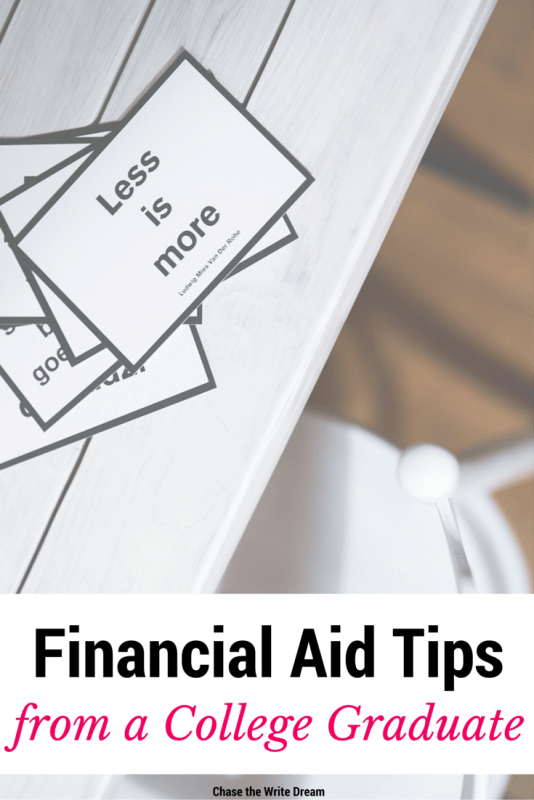Let’s face it – to be competitive in a large number of career fields, you need to have a college degree of some sort. Although getting the extra education and acquiring new skills are great things, a lot of students struggle with the overall costs.
That’s where these financial aid tips come into play.
You’ve probably heard stories about students going to college for free or landing a huge scholarship that allowed them to go to a private school instead of a state one. These stories are great to hear, but the reality is that a lot of students end up being unable to relate.
As a former student who has been down the college path both for undergraduate and graduate degrees, I wanted to put my own financial aid tips out there so that students could get a realistic perspective and approach for how to handle the process.
Complete the FAFSA On-Time
When a school tells you that they give priority to students who complete their FAFSA before a certain date, they really mean it. I think that a lot of people delay the process because it can be time-consuming, especially if you haven’t filed your taxes yet or you have tons of paperwork together (think tax information from your parents, etc.).
You could probably call all the colleges in the country and I guarantee that almost all of the people you would talk to would ask if you have completed your FAFSA yet. Do yourself a favor and fill out the form as soon as possible, ideally before March 1st. Doing this one step will help set the stage for the rest of the financial aid tips below.
Financial Aid Tips Regarding the FAFSA:
- Complete no later than March 1st
- Have your parent’s tax returns and documents on-hand
- Have your personal tax returns and documents on-hand
- Know which school’s you will need to look up codes for (or know the codes)
- Know you and your parent’s personal identifying information (DOB, SSN, etc.)
- Have your PIN set up
Understand All of Your School’s Financial Aid Forms

One out of every three college students will be chosen for verification, meaning that you’ll be required to submit a whole bunch of extra paperwork in addition to the FAFSA that you completed.
You can get a head start on gathering these documents by going to your school’s financial aid website and looking through all the various forms that are available. They should tell you who needs to fill out which form and what information needs to be included. If you have questions or can’t find the forms, contact someone at the school and ask them which forms might be required if you get chosen for verification, need to prove residency, or have another life circumstance happen.
I listed this in my financial aid tips for college students because it can save you a lot of time and stress later on. The worst thing that could happen is that you don’t have to turn in any additional paperwork and you get your awards without extra effort.
Reduce Your Awarded Loan Amounts
A lot of students don’t realize that just because the school offered you “x” amount of dollars in loans doesn’t mean you have to take that full amount. Take the time to calculate out how much you really need for tuition, fees, housing, meals, and extra expenses. Once you’ve done that, add up how much financial aid you’ve received. If you have some extra leftover, think about reducing the amount of the loans you received.
This is one of those financial aid tips that will potentially save you lots of money in the long run because you will have less interest to deal with. Trust me… that stuff adds up quick!
If you have specific questions, make sure you speak to a financial aid officer at your school.
If You Have Extra Financial Aid, Use It to Pay Down Student Loans

The financial aid tips for actually spending your money can vary greatly, but I wanted to present at least a few options that you have. One of the biggest things I’ve learned since leaving college is that student loans are not fun to deal with, meaning you should get rid of them as soon as possible.
A lot of college students take their full financial aid packages during the first semester of two because they want to make sure all of their expenses are covered. After this initial period, many find that they actually can cut back on dining expenses, save money on textbooks, and reduce costs other ways, so that leaves them with a little extra money in their student account.
One of the biggest financial aid tips I can give to students who have this opportunity is to pay off student loans as quickly as possible. I know it can be tempting to use the extra money to buy some new clothes, a new laptop, or buy some cute school supplies at the bookstore, but try your hardest to resist! Get those loans out of the way so that you can enjoy a debt-free life earlier on.
Ways to Cut Expenses so That Your Loans Don’t Get Out of Control
- Buy used textbooks or rent them
- Choose the cheapest dining plan that fits your eating habits
- Don’t feel like you have to go with the most expensive dorm room or housing option

Financial Aid Tips for Everyone: Find and Apply for Scholarships at Any Time!
You don’t have to be a new freshman in college to be eligible for scholarships. There are tons of awards available for students and potential students from all walks of life! Take the time to do some searches on the internet, through a scholarship board, or in your community to see what’s out there. The free money is waiting for you!
The ultimate goal of these financial aid tips is to help you think practically while also reducing some of the stress that you might experience from all the money talk that goes on in college. What are some things that you can think of that might help college students who are going through this process right now?
Want more info? Check out these posts:




This would have been such great info to have as an undergrad!
xo katie // a touch of teal
My biggest tip is NOT to discount the small schools. They are much more expensive, of course, but I applied to Clemson and a small liberal arts school. Due to academics, I was offered scholarships from both schools. Of course, the small school offered more, so I had to make sure that the actual cost would be less. Penny for penny, it was less expensive for me to attend my dream school, which was also closer to home-saving money in gas for trips home-than going to Clemson.
Also, if you have any skills that schools want, like music, you can play their financial aide offices against each other – especially at small schools. My friend’s husband, who played the organ, which isn’t something you find everyday, would call the different offices and tell them what the other schools were offering. He wanted to go to our school because most of the schools required people to live on campus, including our’s, but his family lived close enough for him to live at home and save even more money. So, even without the skill, it doesn’t hurt to call around to the smaller schools because they need smart students. They have plenty of non-smart ones who will pay full tuition, but they have to keep the school up, academically speaking.
Finally, for high schoolers, I would say to develop a skill. I switched from playing the flute to the oboe. I even played the bassoon. I ended up not doing music in college, but I could have easily used that for scholarships. So, you don’t have to be a start athlete to get a scholarship!
Thank you SO much for your comment, Sarah! You provide some great information about shopping around to the various financial aid offices. I think that students can really use that to their advantage. I also agree with looking at the smaller schools… sometimes they do end up offering the best packages 🙂
I don’t know if things have changed since I did my FAFSA but, we were able to connect to the IRS directly once you have your FAFSA pin number.. great tips
Great tips on how to reduce or pay down your financial aid. As a graduate myself, I am still stuck with these ugly little things rearing their heads in my inbox. I wish I could have been more proactive about paying them down or using your tip of not taking everything that was offered… only what I needed! Thanks.
I wish I would have know these things 20 years ago…
These are good tips, I will save this for my little brother. He is graduating next year and looking into college now, starting to plan. I have told him some of this, but he won’t listen to me because I am his big sister and all 🙂
Great tips, and my husband and I need them right about now! He’s going for his masters and they do not have financial aid for masters, just student loans. He was lucky enough to go all 4 years of undergraduate without needing student loans, but we have been accumulating them fast now. The good thing is he’s finishing a year earlier than expected so there will be less loans than we would usually need!
I have seen people take out so much extra in loans to pay their living expenses…and not work, etc. Crazy to have those huge loans to pay back and maybe not be able to find a good job after all that hard work!!
I’m glad you added some tips for ways to cut expenses. I think that that’s a big problem with a lot of students nowadays, that they end up taking out way more student loans then they really needed to because they can’t live within their means.
Great tips! I worked in higher ed for six years, and the financial aid process infuriates me, in part because kids who are 18 often don’t get that this not “free money.” How much financial aid you take on affects you for years, even decades, into the future.
Great tips! I would add that any graduating high school student should strongly consider community college. Most community colleges offer all kinds of scholarships for students who have even decent grades, plus it isn’t uncommon for counties to have programs that send students to community college for free. The best way to reduce college debt is to get half of your education paid for!
It works differently for university here in the UK but it still can be hard to juggle the money for fees, accommodation, food etc. but some of the tips still work like renting or buying your textbooks second hand/
Thanks for stopping by, Hannah! How does it work over there? I’m always curious to hear how other countries do things.
My mom still shudders when she hears the word Fafsa! 🙂
I recently did a similar post (http://wp.me/p5JNqi-rM) because I got myself saddled with six figures worth of student loans, plus my parents took out some as well. I think avoiding taking out the extra is a HUGE way to save future hassle. They try to tell you that student loans don’t affect your credit score/report but they actually do. Because it reflects a higher debt to income ratio which is not good and can prevent you from getting approved for a lot.
Another big tip I always tell people? take your gen eds at a community college on summer break, before you start school or while you’re in HS. I calculated (for myself) that I could have saved close to $15,000 in student loans if I took a few semesters of gen eds at a community college.
Thanks for sharing, Angela! I agree that getting your gen ed courses done at a community college is SO beneficial.
Thankfully I didn’t need any loans for college but several of my friends did. These are wonderful tips!
These are great, and some I wish I new when I was going to college! I never knew I could apply to scholarships when in college. Now I have to pay down a huge debt and it is such a burden! Take these tips people! 🙂
i wonder if I would have used some of these tips I wouldn’t still be paying off my student loans